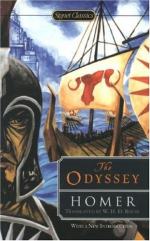’Thou art not Odysseus my father, but some god beguiles me, that I may groan for more exceeding sorrow. For it cannot be that a mortal man should contrive this by the aid of his own wit, unless a god were himself to visit him, and lightly of his own will to make him young or old. For truly, but a moment gone, thou wert old and foully clad, but now thou art like the gods who keep the wide heaven.’
Then Odysseus of many counsels answered him saying: ’Telemachus, it fits thee not to marvel overmuch that thy father is come home, or to be amazed. Nay for thou shalt find no other Odysseus come hither any more; but lo, I, all as I am, after sufferings and much wandering have come in the twentieth year to mine own country. Behold, this is the work of Athene, driver of the spoil, who makes me such manner of man as she will,—for with her it is possible,— now like a beggar, and now again like a young man, and one clad about in rich raiment. Easy it is for the gods who keep the wide heaven to glorify or to abase a mortal man.’
With this word then he sat down again; but Telemachus, flinging himself upon his noble father’s neck, mourned and shed tears, and in both their hearts arose the desire of lamentation. And they wailed aloud, more ceaselessly than birds, sea-eagles or vultures of crooked claws, whose younglings the country folk have taken from the nest, ere yet they are fledged. Even so pitifully fell the tears beneath their brows. And now would the sunlight have gone down upon their sorrowing, had not Telemachus spoken to his father suddenly:
’And in what manner of ship, father dear, did sailors at length bring thee hither to Ithaca? and who did they avow them to be? For in no wise, I deem, didst thou come hither by land.’
And the steadfast goodly Odysseus answered him: ’Yea now, my child, I will tell thee all the truth. The Phaeacians brought me hither, mariners renowned, who speed other men too upon their way, whosoever comes to them. Asleep in the swift ship they bore me over the seas and set me down in Ithaca, and gave me splendid gifts, bronze and gold in plenty and woven raiment. And these treasures are lying by the gods’ grace in the caves. But now I am come hither by the promptings of Athene, that we may take counsel for the slaughter of the foemen. But come, tell me all the tale of the wooers and their number, that I may know how many and what men they be, and that so I may commune with my good heart and advise me, whether we twain shall be able alone to make head against them without aid, or whether we should even seek succour of others.’




